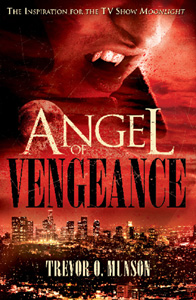 In this era of Twilight, The Vampire Diaries, and True Blood, it’s popular to hate on vampires. They’re so overused, so lame, so neutered, and so Hot Topic. I concur. I’ve shared in those criticisms myself while shoving down my deep dark secret: I love vampire stories. Even worse, I don’t give a damn about “taking them back” into the realm of horror. I like vampire soap operas. The more overwrought it is, the better I like it, and I blame it all on reading Anne Rice at a most melodramatic age. (13. Yeah, that was too young. Believe me.)
In this era of Twilight, The Vampire Diaries, and True Blood, it’s popular to hate on vampires. They’re so overused, so lame, so neutered, and so Hot Topic. I concur. I’ve shared in those criticisms myself while shoving down my deep dark secret: I love vampire stories. Even worse, I don’t give a damn about “taking them back” into the realm of horror. I like vampire soap operas. The more overwrought it is, the better I like it, and I blame it all on reading Anne Rice at a most melodramatic age. (13. Yeah, that was too young. Believe me.)
So when Titan Books asked me if I wanted to review Angel of Vengeance, I thought about saving face with a oh-I’m-too-cool-for-this-vampire-stuff attitude, but I was secretly jumping up and down inside. A pulpy vampire novel? Send that over posthaste, my good publishing friends.
And Trevor O. Munson’s book is pulpy in the most classic sense of the word. It’s a vampire noir starring a private eye named Mick Angel. A former jazz musician turned junkie turned vampire, Angel is a fedora-wearing throwback to a golden age of antiheroes.
Sure, the concept is a little obvious. But I have to hand it to Munson — he knows his noir. Angel of Vengeance is like a Mad Libs of genre conventions and the plot plays out exactly as it should. Angel gets a call from a gorgeous dame who wants him to find her sister. As he hunts her through drug dealers, slimy Hollywood producers, strip clubs, and jail cells Angel is abruptly and uncomfortably reminded of his mortal past. His feelings for his beautiful redhaired client only complicate matters, and stir up more memories. You can probably guess the outcome just from the opening chapters if you know your hardboiled detectives and femme fetales. But what pulp story doesn’t broadcast itself? We always catch what the besotted detective misses. It’s all about going along for the smoky and jazzy ride, and Vengeance gives you an easy and cheap one.
As with every writer before him, Munson gave vampire mythology some tweaks, and overall they work. Nothing takes the romantic edge off a fedora-wearing vampire more than his persistent decay problem, or a transformation that unhinges his jaw. There’s only one absolutely glaring misstep, and that’s Angel’s ability to only see black, white, and red. That’s fine — one imagines it would prove challenging for a private eye — but throughout the novel, Mick is able to describe a variety of colors and details that aren’t black, white, or red. It bugged me badly, and made me wonder if it was a first draft concept that just didn’t get cut out.
While some of it is eye-rolling (Angel’s rants on “the world today” feel like every “call me old-fashioned” rant I’ve heard from a 20+ man trying to paint himself like Frank Sinatra), and one villain pops out of nowhere, there’s still enough sleaze, gore, and sex to keep the plot going. (It could have used more sex, but Mick is meant to be a gentleman.) There are some truly dark moments — one of which involves a gas chamber — that makes me wish it would get the big screen treatment. Unfortunately, Mick Angel has already been there, done that with Hollywood as Munson’s novel (then unpublished) was the basis for the short lived series Moonlight. I never saw the series, so I can’t comment too much on the differences, but I really wish it could live again as a straighter adaptation of the book. I think there’s room on television for a vampire who carries a dissection kit with him, and busts noses like Sam Spade. But I suspect Mick Angel is a character out of time in more ways than Munson’s ideal of him. He came too soon to capitalize on the vampire craze, and any new reworking of him will probably hit too late.
Still, I’m hoping Titan and Munson can partner again and give me a few sequels. Angel of Vengeance is exactly the kind of book I like to curl up with at 3am on a Friday night when no one is looking. If you’ve got that secret shame (or were just a big, big fan of Moonlight) then you’ll probably eat this up as much as I did.